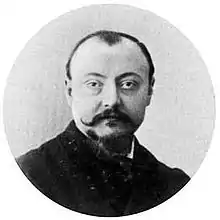
Gustav Geley (13 April 1868 – 15 July 1924) was a French physician, psychical researcher and director of the Institute Metapsychique International from 1919 to 1924.[1]
Career
Geley was born in 1868 at Montceau-les-Mines, France. He studied medicine in Annecy. In 1919, he gave up his practice as a physician and become the director of the Institut Mètapsychique International.[1] He was a spiritist and a believer in reincarnation.[2]
In the early 20th century Joaquin María Argamasilla known as the "Spaniard with X-ray Eyes" claimed to be able to read handwriting or numbers on dice through closed metal boxes. Argamasilla managed to fool Geley and Charles Richet into believing he had genuine psychic powers.[3] In 1924 he was exposed by Harry Houdini as a fraud. Argamasilla peeked through his simple blindfold and lifted up the edge of the box so he could look inside it without others noticing.[4]
Geley investigated the physical mediumship of Eva Carrière and Franek Kluski,[1] and endorsed the abilities of Carrière.[5] It was reported in the Encyclopedia of Occultism and Parapsychology that Geley's "belief system seems to have made him a target for tricks by the mediums he studied and, in the end, capable of suppressing negative evidence."[2]
In 1954, the SPR member Rudolf Lambert published a report revealing details about a case of fraud that was covered up by many early members of the Institute Metapsychique International (IMI).[6] Lambert who had studied Geley's files on Eva Carrière discovered photographs depicting fraudulent ectoplasm taken by her companion Juliette Bisson.[6] Various "materializations" were artificially attached to Eva's hair by wires. The discovery was never published by Geley. Eugene Osty (the director of the institute) and members Jean Meyer, Albert von Schrenck-Notzing and Charles Richet all knew about the fraudulent photographs but were firm believers in mediumship phenomena so demanded the scandal be kept secret.[6]
According to James Randi, Geley had a "very strong need for belief in the hereafter", as evidenced by Geley's statement, "Robbed of its illusions, individual existence seems a real misfortune if it endures only from birth to death.[5] Geley's book Unconscious to the Conscious has been described as "almost a bible of reincarnationism."[7]
Geley died in an airplane accident on 15 July 1924. He was 56.[1]
Publications
References
- 1 2 3 4 "Gustav Geley". Biographical Dictionary of Parapsychology.
- 1 2 "Gustav Geley (1868-1924)". Encyclopedia of Occultism and Parapsychology. 2001. Encyclopedia.com. 30 November 2014.
- ↑ Massimo Polidoro. (2001). Final Séance: The Strange Friendship Between Houdini and Conan Doyle. Prometheus Books. pp. 171–172. ISBN 978-1591020868
- ↑ Joe Nickell. (2007). Adventures in Paranormal Investigation. The University Press of Kentucky. p. 215. ISBN 978-0813124674
- 1 2 Randi, James (1995). An encyclopedia of claims, frauds, and hoaxes of the occult and supernatural: decidedly sceptical definitions of alternative realities. New York, NY: St. Martin's Griffin. ISBN 978-0-312-15119-5.
- 1 2 3 Sofie Lachapelle. (2011). Investigating the Supernatural: From Spiritism and Occultism to Psychical Research and Metapsychics in France, 1853-1931. Johns Hopkins University Press. pp. 144–145. ISBN 978-1421400136
- ↑ J. Gordon Melton, Jerome Clark, Aidan A. Kelly. (1991). New Age Almanac. Visible Ink. ISBN 978-0810394025
Further reading
- Simeon Edmunds. (1966). Spiritualism: A Critical Survey. Aquarian Press. ISBN 978-0850300130
- Georgess McHargue. (1972). Facts, Frauds, and Phantasms: A Survey of the Spiritualist Movement. Doubleday. ISBN 978-0385053051
- Massimo Polidoro. (2003). Secrets of the Psychics: Investigating Paranormal Claims. Prometheus Books. ISBN 978-1591020868